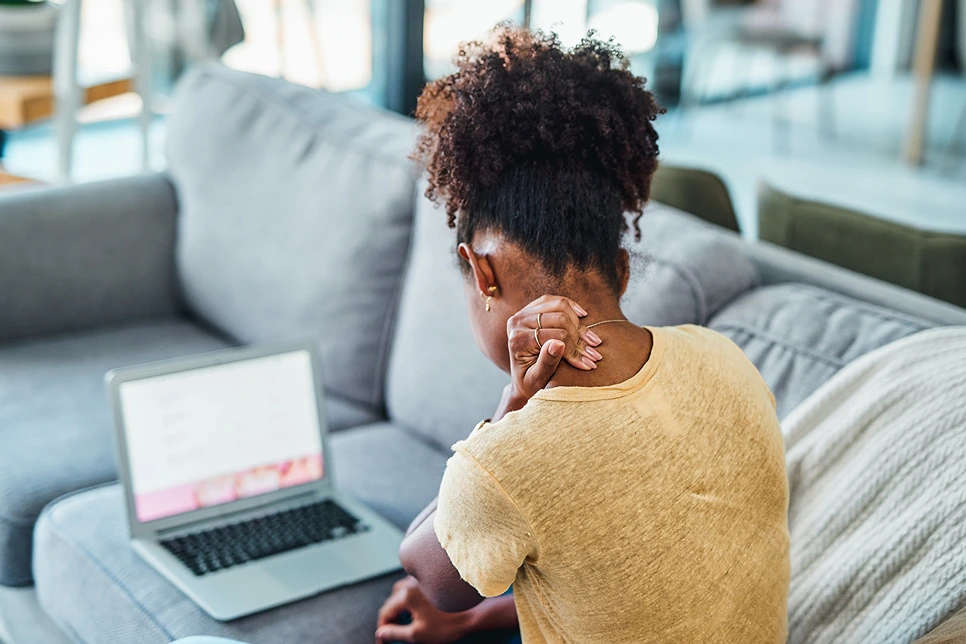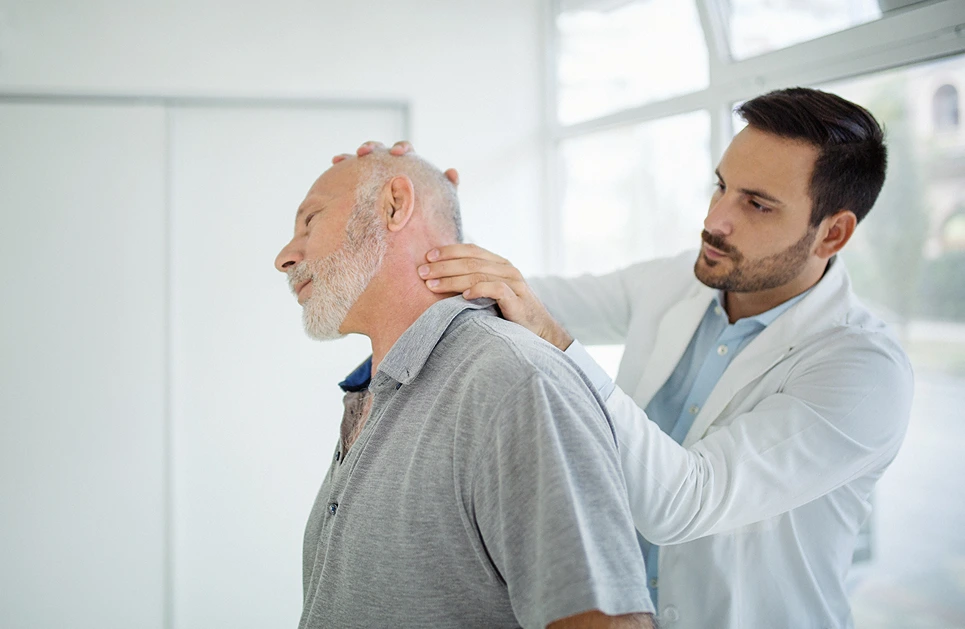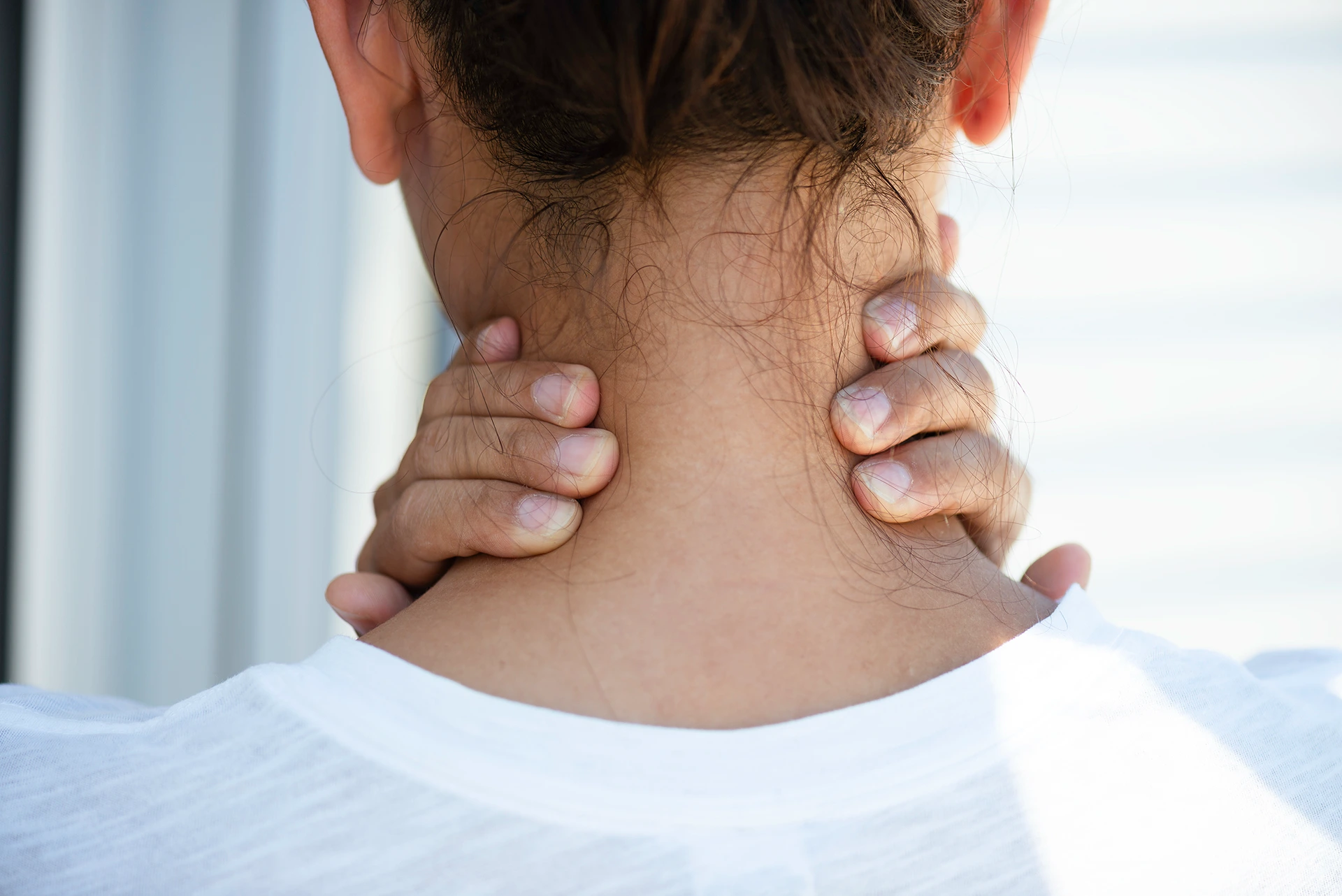Neck muscle pain is a prevalent issue that can arise from several underlying factors, resulting in a sensation of stiffness, tension, or discomfort in the muscles at the back of your neck.
In this comprehensive guide, we’ll explore the anatomy of the neck, what leads to muscle pain, how it’s diagnosed, treatment options, and preventive measures to find relief.
What Muscles Are Located at the Back of the Neck?

To understand neck muscle pain, it helps to know the anatomy. The posterior neck contains multiple layers of muscles that allow you to move your head and support proper posture and alignment.
Key muscles in this area include:
- Semispinalis capitis: Connects the head to the vertebrae to allow backward head extension.
- Splenius capitis and cervicis: Enable sideways tilting and rotation of the head.
- Obliquus capitis superior: Allows you to tilt your head backward.
- Rectus capitis posterior major and minor: Help rotate the head from side to side.
- Multifidus: Stabilizes the vertebrae and spine.
Overuse, injury, or poor posture can strain these muscles and connective tissues, leading to pain and stiffness. Identifying the problematic muscles can help guide treatment. Platforms like Kaly enable you to connect with specialists for accurate assessment.
What Causes Neck Muscle Pain and Tightness?

A variety of factors can contribute to posterior neck muscle pain:
Posture Problems
Poor head, neck, and shoulder posture when sitting at a desk or looking at phones puts excessive strain on the muscles. Prolonged awkward positions fatigue the tissues.
Injuries
Trauma from accidents like whiplash or falls can sprain the neck muscles. Sports injuries are also common culprits.
Stress and Emotional Tension
When stressed, it’s common to tighten neck muscles or hunch shoulders without realizing it. This leads to muscle tension, spasms, and pain.
Muscle Strain
Overuse from excessive exercise, heavy lifting, or repetitive motions can overwork the neck muscles, causing painful spasms.
Arthritis
Degenerative osteoarthritis or inflammatory arthritis like rheumatoid arthritis affecting the cervical spine can cause muscular aches.
Spinal Conditions
Issues like a herniated disc or spinal stenosis put pressure on nerves, resulting in muscle tightness and weakness.
Medical Conditions
Fibromyalgia, meningitis, and certain cancers are examples of conditions that can produce neck muscle pain.
Identifying the source of your discomfort is crucial for proper treatment. Platforms like Kaly can connect you to the right specialists for an accurate diagnosis.
How is Neck Muscle Pain Diagnosed?
To diagnose the cause of posterior neck pain, doctors use:
Medical History
Your doctor will ask about your symptoms, lifestyle, activity levels, and any past injuries or conditions.
Physical Exam
Examining posture and palpating for muscle tightness helps pinpoint the location and severity of pain. Range of motion tests also help assess muscle function.
Imaging Tests
X-rays, MRIs, or CT scans may be used to get a detailed look at the cervical spine and soft tissues. This can reveal issues like disc bulges or arthritis.
Specialist Referral
For complex cases, you may be referred to a physical therapist, rheumatologist, neurologist, or other specialists for further evaluation and neck muscle treatment.
Don’t hesitate to seek professional help if neck pain persists or causes concern. Platforms like Kaly provide access to vetted specialists for accurate diagnosis.
What Are the Treatment Options for Neck Muscle Pain?

Several conservative treatment approaches can provide relief for posterior neck muscle pain:
Medications
Over-the-counter non-steroidal anti-inflammatories (NSAIDs) like ibuprofen can ease muscular aches and inflammation. Muscle relaxants may also be prescribed for severe spasms.
Physical Therapy
Stretching, massage, exercises, manual therapy, and modalities like heat/ice therapy can help relax tight muscles and restore range of motion.
Posture Retraining
Working with a physical therapist or chiropractor to improve posture and movement patterns takes strain off the neck muscles.
Alternative Therapies
Methods like acupuncture, dry needling, and trigger point injections may provide relief for chronic neck muscle tightness.
Steroid Injections
For severe pain due to disc issues or arthritis, epidural steroid injections around the cervical spine may help.
Surgery
Surgery to address serious underlying spinal conditions causing muscular pain may be an option for some patients.
Finding the right treatment depends on the cause and severity of your neck muscle pain. Platforms like Kaly allow you to efficiently find therapists and doctors in your area for customized care.
How Can I Prevent Neck Muscle Pain?

Making targeted lifestyle changes and using proper biomechanics can help prevent neck muscle tightness and pain:
Maintain Good Posture
Avoid hunching shoulders or craning your neck forward, especially when working at a desk or looking at a phone. Keep the spine aligned.
Reduce Repetitive Motions
Take breaks when doing repetitive tasks to avoid overworking the neck muscles. Vary your movements and posture.
Exercise the Neck and Upper Back
Do targeted exercises like chin tucks and shoulder rolls to strengthen the neck and upper back muscles. This supports the neck area.
Manage Stress
Try calming practices like yoga, meditation, and massage to prevent stress-related neck muscle tension. Take regular breaks.
Adjust Your Workstation
An ergonomic setup with your screen, chair, and keyboard positioned correctly reduces strain on the neck.
Use Proper Form With Sports
Whether weightlifting or playing sports, always use good biomechanics to avoid neck muscle injury.
By understanding the causes of neck muscle pain and taking preventive steps, you can find relief. Kaly makes it easy to access specialized care if pain persists. With the right treatment plan, you can keep your neck muscles relaxed and pain-free.
FAQs on Back of Neck Muscle Pain
How Does the Spinal Column Affect Muscle Pain in the Back of the Neck?
The spinal column, particularly the cervical vertebrae, plays a crucial role in neck muscle pain. Issues like bone spurs or spinal nerve compression can cause muscle pain in the back of the neck.
What’s the Difference Between Acute and Chronic Pain in the Neck Muscles?
Acute pain in the neck muscles is usually temporary and often due to injury or strain. Chronic pain persists for an extended period and may be due to ongoing conditions like arthritis or poor posture.
Is a Muscle Relaxant Helpful for a Stiff Neck?
Muscle relaxants can be prescribed for a stiff neck to ease muscle tightness and pain, but they should be used in conjunction with other treatments like physical therapy for long-term relief.
How Can Healthcare Providers Assist in Managing Severe Pain in the Cervical Vertebrae Area?
Healthcare providers can diagnose the cause of severe pain in the cervical vertebrae and recommend appropriate treatments such as medication, physical therapy, or alternative therapies to manage the pain effectively.
Can Regular Exercise Prevent Muscle Tension in the Neck?
Yes, regular exercise, particularly neck and shoulder stretches, can help maintain muscle flexibility and strength, reducing the risk of muscle tension and pain in the neck.
Is Using a Heating Pad Beneficial for Neck Muscle Pain Relief?
A heating pad can be beneficial for neck muscle pain, as it helps to increase blood flow and relax tight muscles, providing relief from pain and stiffness.
When Should Someone with Persistent Neck Muscle Pain Consult a Healthcare Provider?
Persistent or severe neck muscle pain, especially if accompanied by symptoms like numbness, weakness, or loss of mobility, should prompt a visit to a healthcare provider for proper diagnosis and treatment.
